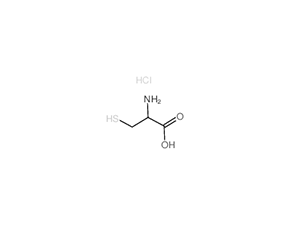
L-Cysteine HCl
CAS No. 52-89-1
L-Cysteine HCl( L-Cysteine hydrochloride? )
Catalog No. M21191 CAS No. 52-89-1
L-Cysteine HCl is a conditionally essential amino acidL-Cysteine hydrochloride suppresses ghrelin and reduces appetite in rodents and humans.
Purity : >98% (HPLC)
 COA
COA
 Datasheet
Datasheet
 HNMR
HNMR
 HPLC
HPLC
 MSDS
MSDS
 Handing Instructions
Handing Instructions
| Size | Price / USD | Stock | Quantity |
| 500MG | 37 | Get Quote |


|
| 1G | 43 | Get Quote |


|
Biological Information
-
Product NameL-Cysteine HCl
-
NoteResearch use only, not for human use.
-
Brief DescriptionL-Cysteine HCl is a conditionally essential amino acidL-Cysteine hydrochloride suppresses ghrelin and reduces appetite in rodents and humans.
-
DescriptionL-Cysteine HCl is a conditionally essential amino acidL-Cysteine hydrochloride suppresses ghrelin and reduces appetite in rodents and humans.
-
In Vitro——
-
In Vivo——
-
SynonymsL-Cysteine hydrochloride?
-
PathwayOthers
-
TargetOther Targets
-
Recptorothers
-
Research Area——
-
IndicationErythropoietic Protoporphyria
Chemical Information
-
CAS Number52-89-1
-
Formula Weight157.62
-
Molecular FormulaC3H8ClNO2S
-
Purity>98% (HPLC)
-
SolubilityDMSO:31 mg/mL (196.67 mM)
-
SMILESCl.NC(CS)C(=O)O
-
Chemical Name——
Shipping & Storage Information
-
Storage(-20℃)
-
ShippingWith Ice Pack
-
Stability≥ 2 years
Reference
1.McGavigan AK et al. L-cysteine suppresses ghrelin and reduces appetite in rodents and humans. Int J Obes (Lond). 2015 Mar;39(3):447-55.
molnova catalog



related products
-
Eptifibatide acetate
Eptifibatide an antiplatelet drug of the glycoprotein IIb/IIIa inhibitor class is a cyclic heptapeptide constructed from 6 amino acids and a mercaptopropionyl residue.
-
Angiotensin II type ...
Angiotensin II type 1 receptor (181 - 187), AT1, ATE.
-
DL-Metanephrine-d3 H...
DL-Metanephrine-d3 Hydrochloride is L-Metanephrine labeled with deuterium atoms and can be used to study the metabolic flow of L-Metanephrine in the body.



 Cart
Cart
 sales@molnova.com
sales@molnova.com


